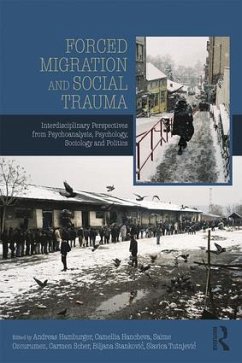Forced Migration and Social Trauma
Interdisciplinary Perspectives from Psychoanalysis, Psychology, Sociology and Politics
Herausgeber: Hamburger, Andreas; Özcürümez, Saime; Hancheva, Camellia
Forced Migration and Social Trauma
Interdisciplinary Perspectives from Psychoanalysis, Psychology, Sociology and Politics
Herausgeber: Hamburger, Andreas; Özcürümez, Saime; Hancheva, Camellia
- Broschiertes Buch
- Merkliste
- Auf die Merkliste
- Bewerten Bewerten
- Teilen
- Produkt teilen
- Produkterinnerung
- Produkterinnerung
Forced Migration and Social Trauma addresses the topic of social trauma and migration by bringing together a broad range of interdisciplinary and international contributors, comprising refugee care practitioners, trauma researchers, sociologists and specialists in public policy from all along the Balkan refugee route into Europe.
Andere Kunden interessierten sich auch für
![Mutual Growth in the Psychotherapeutic Relationship Mutual Growth in the Psychotherapeutic Relationship]() Patricia BrattMutual Growth in the Psychotherapeutic Relationship52,99 €
Patricia BrattMutual Growth in the Psychotherapeutic Relationship52,99 €![A Psychoanalytic Exploration of Social Trauma A Psychoanalytic Exploration of Social Trauma]() A Psychoanalytic Exploration of Social Trauma32,99 €
A Psychoanalytic Exploration of Social Trauma32,99 €![Citizen Humanitarianism at European Borders Citizen Humanitarianism at European Borders]() Citizen Humanitarianism at European Borders45,99 €
Citizen Humanitarianism at European Borders45,99 €![Forced Endings in Psychotherapy and Psychoanalysis Forced Endings in Psychotherapy and Psychoanalysis]() Anne Power (UK Regent's University London)Forced Endings in Psychotherapy and Psychoanalysis63,99 €
Anne Power (UK Regent's University London)Forced Endings in Psychotherapy and Psychoanalysis63,99 €![Uprooted Minds Uprooted Minds]() Nancy Caro HollanderUprooted Minds51,99 €
Nancy Caro HollanderUprooted Minds51,99 €![Psychoanalysis and Holocaust Testimony Psychoanalysis and Holocaust Testimony]() Psychoanalysis and Holocaust Testimony41,99 €
Psychoanalysis and Holocaust Testimony41,99 €![Traumatic Narcissism Traumatic Narcissism]() Daniel ShawTraumatic Narcissism40,99 €
Daniel ShawTraumatic Narcissism40,99 €-
-
-
Forced Migration and Social Trauma addresses the topic of social trauma and migration by bringing together a broad range of interdisciplinary and international contributors, comprising refugee care practitioners, trauma researchers, sociologists and specialists in public policy from all along the Balkan refugee route into Europe.
Hinweis: Dieser Artikel kann nur an eine deutsche Lieferadresse ausgeliefert werden.
Hinweis: Dieser Artikel kann nur an eine deutsche Lieferadresse ausgeliefert werden.
Produktdetails
- Produktdetails
- Verlag: Taylor & Francis Ltd
- Seitenzahl: 294
- Erscheinungstermin: 29. Oktober 2018
- Englisch
- Abmessung: 234mm x 156mm x 16mm
- Gewicht: 446g
- ISBN-13: 9781138361812
- ISBN-10: 113836181X
- Artikelnr.: 53504515
- Herstellerkennzeichnung
- Libri GmbH
- Europaallee 1
- 36244 Bad Hersfeld
- gpsr@libri.de
- Verlag: Taylor & Francis Ltd
- Seitenzahl: 294
- Erscheinungstermin: 29. Oktober 2018
- Englisch
- Abmessung: 234mm x 156mm x 16mm
- Gewicht: 446g
- ISBN-13: 9781138361812
- ISBN-10: 113836181X
- Artikelnr.: 53504515
- Herstellerkennzeichnung
- Libri GmbH
- Europaallee 1
- 36244 Bad Hersfeld
- gpsr@libri.de
Andreas Hamburger is a professor of psychology at the International Psychoanalytic University, Berlin, Germany, a psychoanalyst (DPG), training analyst and supervisor (DGPT). Camellia Hancheva is a senior assistant professor in developmental psychology, a psychotherapist and supervisor at Sofia University St. Kliment Ohridski, Bulgaria. Saime Ozcurumez, PhD, is Director of the Human Mobility Processes and Interactions (HMPI) Research Lab and an associate professor in the Department of Political Science and Public Administration at Bilkent University, Ankara, Turkey. Carmen Scher, MA, is Head of the International Office at the International Psychoanalytic University in Berlin, Germany. Biljana Stankovi¿, PhD, is an assistant professor of psychology within the Faculty of Philosophy, University of Belgrade, Serbia. Slavica Tutnjevi¿, PhD, is an assistant professor of developmental psychology within the Faculty of Philosophy, University of Banja Luka, Bosnia and Herzegovina.
Preface by Vamik Volkan; Preface by Ivan Krastev; Dreams to nightmares- welcoming culture, xenophobia and social trauma along the Balkan route: an introduction Andreas Hamburger, Camellia Hancheva, Saime Ozcurumez, Carmen Scher, Biljana Stankovi
, Slavica Tutnjevi
PART I: Refugees in public policy and social representation Introduction to Part I by Saime Ozcurumez Chapter 1: International Protection and Psycho-Social Support Services Saime Ozcurumez Chapter 2:Political Traumatisation and Trauma-Discourse Marcus Kumpfmüller Chapter 3: Social Trauma in International Refugee Legislation Jean-Jacques Petrucci & Andreas Hamburger Chapter 4: Visual constructions of 'refugeeness' and portrayal of flight in German newspapers Jelena Jovi
i
Chapter 5: Media Coverage of Refugees and Policy Processes: Serbia and the Refugee Crisis in the 2000s Momir Turudi
Chapter 6: How "Words Matter": Reporting on Refugees and Migrants in Europe arka Radoja Chapter 7:Refugees in public policy and social representation: workshop results Andreas Hamburger PART II: Trauma and Migration: Psychological Aspects of forced Migration and Mental Health Introduction to Part II Trauma and Migration - Psychological Aspects of forced Migration and Mental HealthAndreas Hamburger & Camellia Hancheva Chapter 8: Syrian 'Guests' and the 'Receiving' Communities: Traumatization of Being an Outsider/Insider Gamze Ozcurumez Bilgili Chapter 9: Inner Emigration Horst Kächele Chapter 10: How Can Refugees Heal? Reflections on Healing Practices across the Refugee Process - from Displacement to Integration, Return and Beyond Selma Porobi
Chapter 11: Mental Health in Refugee children and youth Anastasia Zissi Chapter 12: Methods and ethics in refugee research Maa Vuk
evi
Markovi
& Jovana Bjeki
Chapter 13: Mental Health in Refugees: Workshop Results Nikola Atanassov, Dijana
uri
, Aleksandra Hadi
, Camellia Hancheva, Horst Kächele, Diana Ridji
, Marko Tomaevi
PART III: Child Refugees Introduction to Part III Slavica Tutnjevi
Chapter 14: Child Refugee: Transition, Migration and Transitional Phenomena Camellia Hancheva Chapter 15: "Here I found my place": Perspectives of Refugee Children in Serbia on Psychosocial Support Programmes Maa Avramovi
& Biljana Stankovi
Chapter 16: Former Child Refugees - Quarter of a Century Later Slavica Tutnjevi
Chapter 17: Quest of Identity in Unattended Minor Refugees Leonie-Marie Anft Chapter 18: Child Refugees: Workshop Results Camellia Hancheva PART IV: Helpers, Volunteers and Vicarious Trauma Introduction to Part IV Biljana Stankovi
Chapter 19: Volunteers and Refugee Identity Sotiris Chtouris & Anastasia Zissi Chapter 20: Yoga as a Mindfulness-based Intervention for Refugees and Helpers Stella Schreiber Chapter 21: Secondary Traumatization in Service Providers working with Refugees Maa Vuk
evi
Markovi
& Marko ivanovi
Chapter 22: Helpers, Volunteers and Vicarious Trauma Biljana Stankovi
, Slavica Tutnjevi
PART I: Refugees in public policy and social representation Introduction to Part I by Saime Ozcurumez Chapter 1: International Protection and Psycho-Social Support Services Saime Ozcurumez Chapter 2:Political Traumatisation and Trauma-Discourse Marcus Kumpfmüller Chapter 3: Social Trauma in International Refugee Legislation Jean-Jacques Petrucci & Andreas Hamburger Chapter 4: Visual constructions of 'refugeeness' and portrayal of flight in German newspapers Jelena Jovi
i
Chapter 5: Media Coverage of Refugees and Policy Processes: Serbia and the Refugee Crisis in the 2000s Momir Turudi
Chapter 6: How "Words Matter": Reporting on Refugees and Migrants in Europe arka Radoja Chapter 7:Refugees in public policy and social representation: workshop results Andreas Hamburger PART II: Trauma and Migration: Psychological Aspects of forced Migration and Mental Health Introduction to Part II Trauma and Migration - Psychological Aspects of forced Migration and Mental HealthAndreas Hamburger & Camellia Hancheva Chapter 8: Syrian 'Guests' and the 'Receiving' Communities: Traumatization of Being an Outsider/Insider Gamze Ozcurumez Bilgili Chapter 9: Inner Emigration Horst Kächele Chapter 10: How Can Refugees Heal? Reflections on Healing Practices across the Refugee Process - from Displacement to Integration, Return and Beyond Selma Porobi
Chapter 11: Mental Health in Refugee children and youth Anastasia Zissi Chapter 12: Methods and ethics in refugee research Maa Vuk
evi
Markovi
& Jovana Bjeki
Chapter 13: Mental Health in Refugees: Workshop Results Nikola Atanassov, Dijana
uri
, Aleksandra Hadi
, Camellia Hancheva, Horst Kächele, Diana Ridji
, Marko Tomaevi
PART III: Child Refugees Introduction to Part III Slavica Tutnjevi
Chapter 14: Child Refugee: Transition, Migration and Transitional Phenomena Camellia Hancheva Chapter 15: "Here I found my place": Perspectives of Refugee Children in Serbia on Psychosocial Support Programmes Maa Avramovi
& Biljana Stankovi
Chapter 16: Former Child Refugees - Quarter of a Century Later Slavica Tutnjevi
Chapter 17: Quest of Identity in Unattended Minor Refugees Leonie-Marie Anft Chapter 18: Child Refugees: Workshop Results Camellia Hancheva PART IV: Helpers, Volunteers and Vicarious Trauma Introduction to Part IV Biljana Stankovi
Chapter 19: Volunteers and Refugee Identity Sotiris Chtouris & Anastasia Zissi Chapter 20: Yoga as a Mindfulness-based Intervention for Refugees and Helpers Stella Schreiber Chapter 21: Secondary Traumatization in Service Providers working with Refugees Maa Vuk
evi
Markovi
& Marko ivanovi
Chapter 22: Helpers, Volunteers and Vicarious Trauma Biljana Stankovi
Preface by Vamik Volkan; Preface by Ivan Krastev; Dreams to nightmares- welcoming culture, xenophobia and social trauma along the Balkan route: an introduction Andreas Hamburger, Camellia Hancheva, Saime Ozcurumez, Carmen Scher, Biljana Stankovi
, Slavica Tutnjevi
PART I: Refugees in public policy and social representation Introduction to Part I by Saime Ozcurumez Chapter 1: International Protection and Psycho-Social Support Services Saime Ozcurumez Chapter 2:Political Traumatisation and Trauma-Discourse Marcus Kumpfmüller Chapter 3: Social Trauma in International Refugee Legislation Jean-Jacques Petrucci & Andreas Hamburger Chapter 4: Visual constructions of 'refugeeness' and portrayal of flight in German newspapers Jelena Jovi
i
Chapter 5: Media Coverage of Refugees and Policy Processes: Serbia and the Refugee Crisis in the 2000s Momir Turudi
Chapter 6: How "Words Matter": Reporting on Refugees and Migrants in Europe arka Radoja Chapter 7:Refugees in public policy and social representation: workshop results Andreas Hamburger PART II: Trauma and Migration: Psychological Aspects of forced Migration and Mental Health Introduction to Part II Trauma and Migration - Psychological Aspects of forced Migration and Mental HealthAndreas Hamburger & Camellia Hancheva Chapter 8: Syrian 'Guests' and the 'Receiving' Communities: Traumatization of Being an Outsider/Insider Gamze Ozcurumez Bilgili Chapter 9: Inner Emigration Horst Kächele Chapter 10: How Can Refugees Heal? Reflections on Healing Practices across the Refugee Process - from Displacement to Integration, Return and Beyond Selma Porobi
Chapter 11: Mental Health in Refugee children and youth Anastasia Zissi Chapter 12: Methods and ethics in refugee research Maa Vuk
evi
Markovi
& Jovana Bjeki
Chapter 13: Mental Health in Refugees: Workshop Results Nikola Atanassov, Dijana
uri
, Aleksandra Hadi
, Camellia Hancheva, Horst Kächele, Diana Ridji
, Marko Tomaevi
PART III: Child Refugees Introduction to Part III Slavica Tutnjevi
Chapter 14: Child Refugee: Transition, Migration and Transitional Phenomena Camellia Hancheva Chapter 15: "Here I found my place": Perspectives of Refugee Children in Serbia on Psychosocial Support Programmes Maa Avramovi
& Biljana Stankovi
Chapter 16: Former Child Refugees - Quarter of a Century Later Slavica Tutnjevi
Chapter 17: Quest of Identity in Unattended Minor Refugees Leonie-Marie Anft Chapter 18: Child Refugees: Workshop Results Camellia Hancheva PART IV: Helpers, Volunteers and Vicarious Trauma Introduction to Part IV Biljana Stankovi
Chapter 19: Volunteers and Refugee Identity Sotiris Chtouris & Anastasia Zissi Chapter 20: Yoga as a Mindfulness-based Intervention for Refugees and Helpers Stella Schreiber Chapter 21: Secondary Traumatization in Service Providers working with Refugees Maa Vuk
evi
Markovi
& Marko ivanovi
Chapter 22: Helpers, Volunteers and Vicarious Trauma Biljana Stankovi
, Slavica Tutnjevi
PART I: Refugees in public policy and social representation Introduction to Part I by Saime Ozcurumez Chapter 1: International Protection and Psycho-Social Support Services Saime Ozcurumez Chapter 2:Political Traumatisation and Trauma-Discourse Marcus Kumpfmüller Chapter 3: Social Trauma in International Refugee Legislation Jean-Jacques Petrucci & Andreas Hamburger Chapter 4: Visual constructions of 'refugeeness' and portrayal of flight in German newspapers Jelena Jovi
i
Chapter 5: Media Coverage of Refugees and Policy Processes: Serbia and the Refugee Crisis in the 2000s Momir Turudi
Chapter 6: How "Words Matter": Reporting on Refugees and Migrants in Europe arka Radoja Chapter 7:Refugees in public policy and social representation: workshop results Andreas Hamburger PART II: Trauma and Migration: Psychological Aspects of forced Migration and Mental Health Introduction to Part II Trauma and Migration - Psychological Aspects of forced Migration and Mental HealthAndreas Hamburger & Camellia Hancheva Chapter 8: Syrian 'Guests' and the 'Receiving' Communities: Traumatization of Being an Outsider/Insider Gamze Ozcurumez Bilgili Chapter 9: Inner Emigration Horst Kächele Chapter 10: How Can Refugees Heal? Reflections on Healing Practices across the Refugee Process - from Displacement to Integration, Return and Beyond Selma Porobi
Chapter 11: Mental Health in Refugee children and youth Anastasia Zissi Chapter 12: Methods and ethics in refugee research Maa Vuk
evi
Markovi
& Jovana Bjeki
Chapter 13: Mental Health in Refugees: Workshop Results Nikola Atanassov, Dijana
uri
, Aleksandra Hadi
, Camellia Hancheva, Horst Kächele, Diana Ridji
, Marko Tomaevi
PART III: Child Refugees Introduction to Part III Slavica Tutnjevi
Chapter 14: Child Refugee: Transition, Migration and Transitional Phenomena Camellia Hancheva Chapter 15: "Here I found my place": Perspectives of Refugee Children in Serbia on Psychosocial Support Programmes Maa Avramovi
& Biljana Stankovi
Chapter 16: Former Child Refugees - Quarter of a Century Later Slavica Tutnjevi
Chapter 17: Quest of Identity in Unattended Minor Refugees Leonie-Marie Anft Chapter 18: Child Refugees: Workshop Results Camellia Hancheva PART IV: Helpers, Volunteers and Vicarious Trauma Introduction to Part IV Biljana Stankovi
Chapter 19: Volunteers and Refugee Identity Sotiris Chtouris & Anastasia Zissi Chapter 20: Yoga as a Mindfulness-based Intervention for Refugees and Helpers Stella Schreiber Chapter 21: Secondary Traumatization in Service Providers working with Refugees Maa Vuk
evi
Markovi
& Marko ivanovi
Chapter 22: Helpers, Volunteers and Vicarious Trauma Biljana Stankovi








